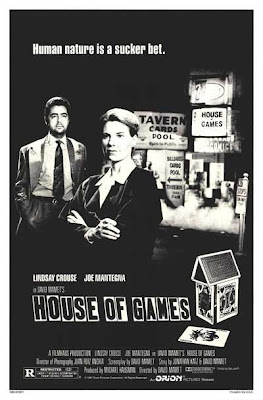
AllMovieGuide Synopsis:
by Linda Rasmussen
In his directorial debut, Pulitzer Prize-winning playwright David Mamet creates a stylish cinematic puzzle of games within games, as con men are joined by a psychologist in creating the perfect caper. Dr. Margaret Ford (Lindsay Crouse), the writer of psychological self-help books, meets Mike (Joe Mantegna) as she attempts to help a patient who owes heavy gambling debts. When she herself is the victim of a con, she becomes intrigued by the psychological drama of the con game and joins in a complicated scam involving a suitcase of cash. Mamet directs his extremely complicated plot with skill and complete control until it is impossible to tell who is the con and who is the victim. The suspense builds to an amazing surprise ending which is both reasonable and believable but completely unpredictable. Crouse and Mantegna are outstanding as are all the supporting performances. Mamet and his cinematographer Juan Ruiz-Anchia create a visually stunning, compelling film that does justice to Mamet's superbly written screenplay
You could call me a minor dabbler in Mamet's work. I'm a fan, but I'm not obsessed with Mamet nor have a breadth of knowledge on the man and his style. I've read a few of his theory/teaching books and have always been more a fan of his ideas than his execution (save for his writing; which is consistently top notch). His last film I was wowed by was the underrated Spartan, which is a great spy film dealing with Mamet's themes of persona's, identity, lying, and the art of "the act". Basically, conning people.
What Mamet film is not about conning people?* He is fascinated with how people behave around others to get what they want. He loves the "acts" that people will perform to manipulate another person; whether it's a con game, a film set, a CIA interrogation room, the White House, etc.
House Of Games is no different. I had never seen this early film of Mamet's before the Criterion edition DVD and was surprised to find that it was filmed in Seattle, where I currently live. I didn't really recognize any of the buildings and only once noticed a street sign, but Mamet says in the supplements that it was his intention to keep it kind of nondescript, no landmarks, and an older part of the city in which parts may have changed(?)**.
Listening to the commentary, it's obvious that Mamet doesn't think too highly of the Psychiatry profession. Pairing psychiatry with "The Art Of The Con" and examining its similarities seems to be this film's intention, with Mamet not making it so painfully obvious that psychiatry could just be a big head game. The "transfer of Confidence" applies not only to street-level con games but to the office of the Psychiatrist. Being a "doctor" gives the patient a feeling of confidence to explain their problems to this total stranger, when they normally cannot even say these same things with their most trusted family member.
I would like to read more about the art of 'Confidence' because I think that you could apply some of its ideas to everyday life, not just to conning people. Parts of it have to do with attitude and persona, how you make others feel and how you can get them to trust you by how you behave. I would like to use this power for good.
There was some nice contemporary noir lighting in the film, out on the night streets and in the smoky pool halls (before the Smoking Ban!). There is also a nice camera move/moment after Margaret secretly sees the gun and the walkie-talkie on the mark she thinks they've set up. There is a slow walk back as we follow her back to tell Joe. Just a nice suspenseful moment and something a little different than the rest of the film. Pure Cinema.
Mantegna has a nice death scene to with his sarcastic quoting of Oliver Twist: "Thank you sir, may I have another!?" Margaret has stopped him, but she hasn't stopped from changing. Perhaps she can live a little more freely and enjoy her success, now that she knows what control is like. But I think it's also possible that her fears about herself could've been confirmed by her relationship and exploration in the film.
Solid first film. I can look over some of the patients' wooden acting (I think the supplements said Mamet wanted it this way too). But I was expecting some elementary camera placement/work and that was certainly not the case, as I've noted above (especially that walk-back shot). It breezed by, so well done editor!
*I'm just kidding. I've haven't seen all his work, please enlighten me.
** Once again, please enlighten me. I am new to the city and don't know much about the history.
No comments:
Post a Comment